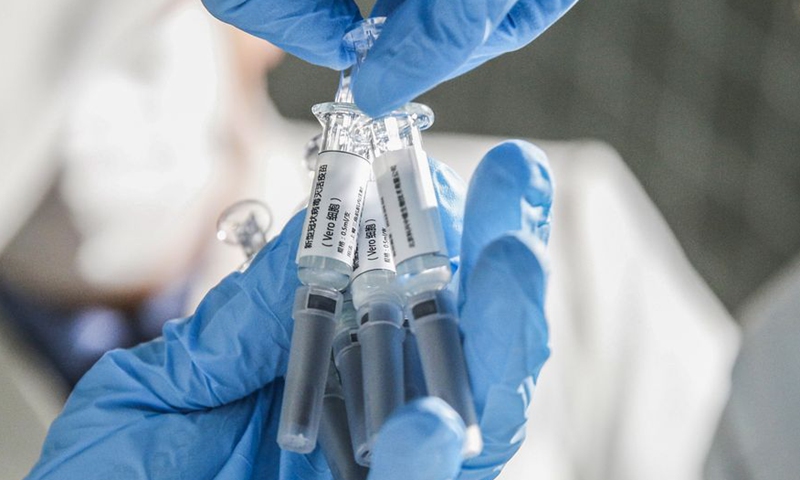IN-DEPTH / IN-DEPTH
Chinese-developed inactivated COVID-19 vaccine offered to frontline medics for urgent use

Photo:Xinhua
China's homegrown inactivated COVID-19 vaccine developed by China National Pharmaceutical Group (Sinopharm) now offer free voluntary injection to front-line medical workers in some state-owned hospitals for urgent use despite the vaccine candidate has not been officially approved for marketing. Many have applied for voluntary vaccinations while some others remain concerned about the safety and efficacy of the vaccine candidate that is still undergoing its late-stage clinical trial overseas, the Global Times learnt from some medical workers who were offered.
Medical workers at some public hospitals in Shanghai have been offered the inactivated vaccine shots for free, but many were sidelined as they take a wait-and-see mind until a more promising result to be heard in the vaccine candidate's phase three clinical trials, a doctor in Shanghai who asks to be anonymous told the Global Times on Tuesday.
Though the vaccine has not been marketed, its free offer for medics is in line with China's vaccine management regulations, said the observers, as the unapproved vaccine candidates are allowed to be used for emergency use in limited scope and period amid major public health emergencies, according to domestic rules.
The Sinopharm refused to give any comment on the matter upon Global Times request.
Sinopharm said on May 29 that clinical data from more than 2,000 cases of the two inactivated vaccines showed that the safety and immunoreactions of the vaccine have been fully verified, with no obvious adverse reactions.
The vaccine now undergoes its phase three clinical trials in the UAE, with the first group of up to 15,000 registered volunteers - including UAE nationals and expatriates - received the vaccine at a medical center Sheikh Khalifa Medical City in Abu Dhabi on July 16.
"Doctors and researchers in vaccine industry generally more welcome the voluntary injection than those clinicians," Tao Lina, a Shanghai-based vaccine researcher who will soon accept the free injection, told the Global Times on Tuesday. "Doctors who expertise in immunology are more confident to the vaccine's safety as we better understand how it induces body's immune system. On contrary, some clinicians are more concerned about the adverse reactions of the vaccine caused as they experienced much more clinical crisis caused by drug's adverse reactions."
"But vaccines are very different from chemicals whose pharmacological and metabolic process contains higher risks. The mechanism by which vaccines trigger the immune system is relatively mature, and the risk of adverse reactions is usually lower than the risk of health damage from natural infection," said Tao.
Employees of state-owned enterprises (SOEs) preparing to go abroad have been offered to administer two choices of Sinopharm's inactivated vaccine shots for urgent use in earlier days, the Global Times reported in June.
Also, more than 1,000 Sinopharm employees, including the head of the company, have been voluntarily vaccinated, as its phase-I and phase-II clinical trials showed optimistic results with few adverse reactions compared to other vaccines currently undergoing trials.

